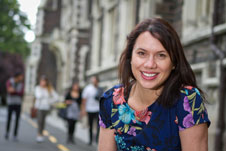 Monday 23 November 2015 9:46am
Monday 23 November 2015 9:46am
Dr Reremoana Theodore
Nearly half of recent Māori university graduates are the first in their immediate family to attend university, one third are parents and the majority (70%) are female, new research from the National Centre for Lifecourse Research shows.
The findings are from the Graduate Longitudinal Study New Zealand (GLSNZ), an ongoing project that, over a 10-year period, will investigate the employment, health and social outcomes of more than 8700 graduates from all eight New Zealand universities. The research is published in the international journal Higher Education Research and Development.
Using information collected when the study participants were in their final year of study in 2011, researchers looked at the backgrounds of more than 600 Māori graduates, what they had studied, how they had studied (e.g. part-time) and their future plans post-graduation.
“Māori graduates are critical for Māori futures and the future of New Zealand” says lead author Dr Reremoana Theodore. “We know that higher education is associated with benefits to the individual graduate, such as employment and better health, and to their communities, such as high rates of community service and reduced poverty.”
Half of Māori graduates studied humanities/education, followed by commerce (18%), science/engineering (15%), health sciences (11%), law (3%) and PhD study (2%). The study found that Māori males were more likely than females to study commerce. The study also found that participants who had children were less likely to study science or engineering compared to those without children; possibly due to the time-intensive nature of coursework required for these degrees.
In terms of future plans post-graduation, the top three fields that graduates wished to work in were education and training (28%), followed by health care and medical (17%) and government (12%).
GLSNZ Co-Director, Dr Karen Tustin, says, “in terms of societal benefits, many Māori graduates were looking to make a difference and a contribution in their future work to the Māori community and to society in general. This was particularly so for those who were the first in their families to attend university. Future follow up of these graduates at two, five and 10 years post-graduation will enable us to determine how these intentions are realised, with the GLSNZ providing valuable information about the benefits of a New Zealand tertiary education over time.”
The study found Māori were under-represented as graduates (7% of the sample) and, in particular, as postgraduates (less than 6% of the total sample), considering that Māori constitute 15 per cent of the New Zealand population. The proportion of Māori studying science/engineering was also lower than for all students.
“Māori student support services, bridging programmes, increasing the numbers of permanent Māori academic and general staff, increased Māori research capability including indigenous methodologies and targeted research funding, and policies and strategies such as Māori participation in governance remain priority areas to ensure Māori students enjoy success at higher levels,” Dr Theodore says. “This requires a whole of university approach to supporting Māori success with adequate government support to further improve outcomes.”
This research was supported by the Tertiary Education Commission, Ministry for Women's Affairs and Ministry of Education. Reremoana Theodore was supported by a Health Research Council Erihapeti Rehu-Murchie fellowship [grant number 13/579].
Publication details:
Māori university graduates: Indigenous participation in higher education
Reremoana Theodore, Karen Tustin, Cynthia Kiro, Megan Gollop, Mele Taumoepeau, Nicola Taylor, Kaa-Sandra Chee, Jackie Hunter and Richie Poulton. Higher Education Research and Development.
For more information, contact:
Dr Reremoana Theodore
Acting Co-Director
National Centre for Lifecourse Research
Department of Psychology
University of Otago
Tel 64 3 479 4171
Email moana.theodore@otago.ac.nz
A list of Otago experts available for media comment is available elsewhere on this website.
Electronic addresses (including email accounts, instant messaging services, or telephone accounts) published on this page are for the sole purpose of contact with the individuals concerned, in their capacity as officers, employees or students of the University of Otago, or their respective organisation. Publication of any such electronic address is not to be taken as consent to receive unsolicited commercial electronic messages by the address holder.
